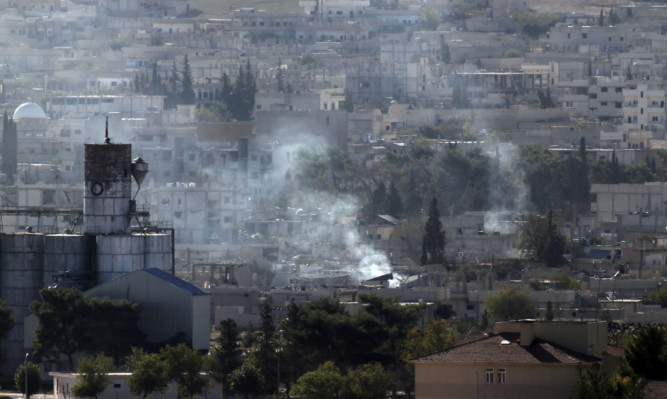More than 700 British extremists have travelled to Syria – and hundreds have returned to the UK, police have revealed.
Scotland Yard said a “significant proportion” of those who made the journey to the war-torn country were intent on joining Islamic State, also known as ISIL.
Assistant Commissioner Mark Rowley, the national police lead for counter-terrorism, said around half are believed to have come back to Britain.
He said: “ISIL and other terrorist groups are trying to direct attacks in the UK, encouraging British citizens to travel to Syria to fight and train, and are seeking, through propaganda, to provoke individuals in the UK to carry out violent attacks here.”
New figures also revealed that suspected terrorists are being arrested at a rate of almost one every day, while police also warned that rising numbers of children are being drawn into extremism.
Fears of a terrorist attack on Britain’s streets have heightened in the wake of the rise of Islamic State (IS), the extremist group that has taken over parts of Iraq and Syria and attracted thousands of foreign jihadists to its cause.
Mr Rowley said: “The number of people who have travelled to Syria has passed 700, in terms of those who are of significant concern to us and the security services.
“They are not aid workers or visiting relatives – they are people of real concern that they are getting involved in fighting or are supportive of it. They are potential terrorist suspects.”
Asked about the number who have returned to the UK, he said: “It is a fairly even balance between those still out there and those who have come back.”
Figures released by the Metropolitan Police today showed there were 338 arrests for suspected terrorism offences in 2014/15. This was an increase of a third compared to the 254 detained in the previous year.
More than half of the arrests were related to Syria.
A total of 89 people were convicted of terror-related offences in 2014/15 while 114 are awaiting trial.
The statistics also revealed increasing numbers of women and teenagers becoming embroiled in extremism.
They showed that more than one in 10 (11%) of those arrested on suspicion of terror-related crimes in 2014/15 were female while 17% were under 20.
Mr Rowley drew parallels between gang crime and the growing trend for youngsters to be drawn into terrorist activities.
“The make-up of terrorism has changed. Those statistics really illustrate that – you would not have seen that five or 10 years ago,” he said.
“That mix of families, women, teenagers getting involved in terrorism is something that comes out.
“It’s not going to be a one-off to see people in their teenage years coming into this. It replicates a bit what we see in gang crime – people with troubled histories get drawn into serious crime and can get drawn into this.”
The number of terror suspects arrested in each quarter has roughly doubled in the last six years, Mr Rowley said. Arrest totals in the last three years were 54% higher than the previous three.
Mr Rowley said the trend appeared to coincide with events in the Middle East
“It’s not to suggest these are all exact triggers but in 10/11 and 11/12 you have got the Arab Spring, the Syria conflict beginning and some of those changing influences and as you get to approaching a year ago you’ve got the declaration of the caliphate (by Isis).
“I see there are three phases – there’s where we were those first three years, then the next three years, 11/12, 12/13, 13/14, you see a significant step up as the Middle East starts to heat up and then the last year with the prominence of Isis and what’s been going on, you see a further step.”
He described the number of arrests by counter-terrorism units across the country in the last year as “quite dramatic”, adding: “You are getting towards now an arrest a day.”
Around two-fifths of the arrests are for offences such as glorifying terrorism or preparation for terrorist acts.
Mr Rowley said the remainder are held on allegations such as fraud or firearms under crime powers with the aim of disrupting suspects who are “looking towards terrorism”.
The counter-terrorist police network is “working at a fair pace” to “keep up with the change in work”, Mr Rowley said, confirming that several plots have been foiled over the last year.
Plans to inflict atrocities in Britain “vary massively” in terms of conspirators’ capabilities, with the most serious often directed or inspired from abroad.
“At one end of the spectrum you’ve got well-organised plots, potentially choreographed and even directed from overseas.
“At the other end, you’ve got people who are inspired by some of the propaganda and messages and other communications coming out from Isis but largely acting of their own volition. Those will often be low-tech in methodology – very basic in terms of bomb-making, using knives or plans to use cars to run people over.
“The challenge for us is that range from the sophisticated, organised, directed through to the volatile lone actor. The reach of this problem into communities is different to what we’ve had before.”
